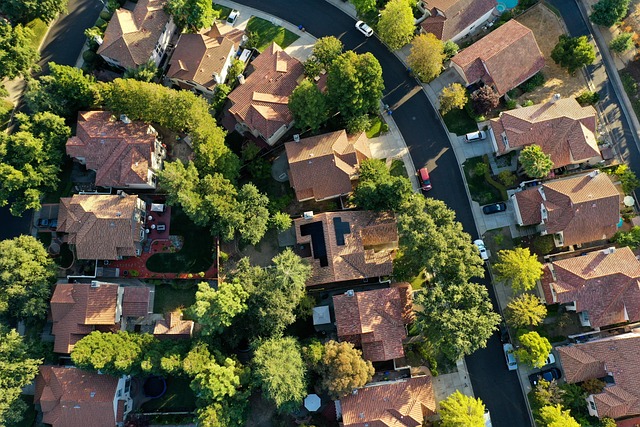Adopting eco-friendly practices is vital for students aiming to create a more sustainable future, especially in shared rentals. By minimizing energy usage, reducing waste, and opting for green alternatives, students can significantly contribute to environmental preservation. Sustainable student living encourages responsible consumption through sharing resources with flatmates, growing herbs and vegetables indoors, and embracing energy-efficient appliances. This fosters a culture of environmental responsibility on campuses and beyond. Eco-friendly rentals, with their energy-saving features and water conservation fixtures, reduce utility bills and carbon footprints. Landlords can support this by offering green options at affordable prices and engaging tenants in conservation efforts. Universities worldwide now offer specialized programs and resources to promote sustainable living, while online communities connect like-minded students globally.
“Embrace a greener lifestyle with eco-friendly student rentals! This guide explores the growing movement towards sustainable housing for students, highlighting its benefits and impact. From understanding eco-conscious choices to practical tips for tenants and landlords’ roles, we navigate the path to a greener future.
Discover how sustainable student living not only reduces environmental impact but also fosters a community dedicated to change. Access resources and connect with like-minded folks, making your academic journey more meaningful and ecologically responsible.”
- Understanding Eco-Friendly Living: A Student's Perspective
- The Benefits of Sustainable Student Housing
- Creating an Eco-Conscious Space: Tips for Tenants
- Landlords' Role in Promoting Sustainable Living
- Resources and Communities for Green Student Life
Understanding Eco-Friendly Living: A Student's Perspective

Adopting eco-friendly practices as a student is an essential step towards creating a more sustainable future, especially within the context of student rentals. For many students, moving into shared accommodation for the first time presents an opportunity to reduce their environmental impact and live in a way that aligns with their values. Eco-friendly living involves making conscious choices to minimize energy usage, reduce waste, and opt for environmentally friendly alternatives in daily routines. This might include simple actions like switching off lights and appliances when not in use, using reusable water bottles instead of single-use plastics, or choosing second-hand furniture to extend the lifespan of resources.
Students can contribute to a greener environment by embracing sustainable student living. It encourages responsible consumption, where sharing resources with flatmates can reduce overall usage. For instance, collectively purchasing cleaning products or bulk food items not only saves money but also cuts down on packaging waste. Additionally, many students are discovering the benefits of growing their own herbs and vegetables indoors, promoting a connection to nature while reducing carbon footprints associated with food transportation. These practices, when embraced by students across campuses, have the potential to create a ripple effect, fostering a culture of environmental awareness and responsibility in the heart of communities.
The Benefits of Sustainable Student Housing

Eco-friendly student rentals offer a unique opportunity to promote sustainable living and create a positive impact on both the environment and individual tenants. In today’s world, where climate change is a pressing issue, embracing sustainable housing practices has become more important than ever before. Student accommodations that prioritize eco-friendliness contribute to reducing carbon footprints and fostering a culture of environmental responsibility among residents.
One significant advantage is the potential for cost savings. Sustainable features such as energy-efficient appliances, LED lighting, and water-conserving fixtures not only benefit the planet but also tenant wallets. These measures can lead to lower utility bills, making eco-friendly rentals an attractive option for students watching their expenses. Additionally, living in an environmentally conscious community encourages residents to adopt greener lifestyles, which can have long-lasting positive effects on both personal habits and collective environmental stewardship.
Creating an Eco-Conscious Space: Tips for Tenants

Creating an eco-conscious space is within reach for tenants in student rentals. Start by opting for energy-efficient appliances and LED lighting, which reduce power consumption and save money on utility bills. Choose reusable or biodegradable products for daily use, such as cloth towels instead of paper ones or a reusable water bottle over disposable plastic options.
Personalize your space with houseplants, which not only add greenery but also act as natural air filters. Consider composting if your rental allows it, diverting food scraps from landfills. Additionally, stay informed about local recycling programs and ensure proper waste segregation to contribute to sustainable student living.
Landlords' Role in Promoting Sustainable Living

Landlords play a pivotal role in promoting sustainable living among students by making eco-friendly options readily available and affordable within their rentals. They can encourage responsible habits through simple yet effective measures like installing energy-efficient appliances, providing access to recycling programs, and opting for environmentally conscious cleaning products. By adopting these practices, landlords contribute significantly to the global push for sustainable student living.
Moreover, landlords can foster a culture of sustainability by engaging with tenants on eco-initiatives. Organizing workshops or sharing resources on energy conservation and waste reduction can empower students to adopt greener lifestyles. Landlords’ proactive approach not only benefits the environment but also attracts environmentally conscious tenants who prioritize sustainable student living.
Resources and Communities for Green Student Life

Students looking to embrace eco-friendly living have a growing array of resources and communities at their disposal. Many universities now offer programs focused on sustainable student living, from green housing options to recycling initiatives and campus-wide sustainability clubs. These platforms not only educate students about environmental issues but also provide opportunities for collective action. Online forums and social media groups dedicated to eco-conscious living further facilitate connections among like-minded individuals, sharing tips and best practices for reducing waste, conserving energy, and adopting sustainable lifestyles.
Additionally, local and national organizations actively support green initiatives on college campuses. From non-profits advocating for renewable energy to businesses providing eco-friendly products and services, these entities offer a wealth of knowledge and resources. Many even partner with universities to implement projects that promote sustainable student living, such as composting programs, sustainable food options, and green transportation solutions. By leveraging these available tools and communities, students can actively contribute to a more environmentally conscious future while enjoying the benefits of eco-friendly living in their rental spaces.






